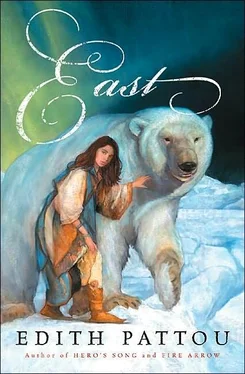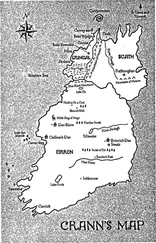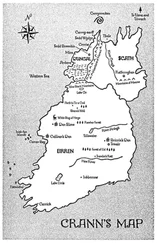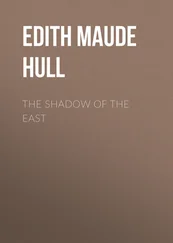Edith Pattou - East
Здесь есть возможность читать онлайн «Edith Pattou - East» весь текст электронной книги совершенно бесплатно (целиком полную версию без сокращений). В некоторых случаях можно слушать аудио, скачать через торрент в формате fb2 и присутствует краткое содержание. Год выпуска: 2002, ISBN: 2002, Издательство: Graphia, Жанр: Старинная литература, на английском языке. Описание произведения, (предисловие) а так же отзывы посетителей доступны на портале библиотеки ЛибКат.
- Название:East
- Автор:
- Издательство:Graphia
- Жанр:
- Год:2002
- ISBN:9780756950545
- Рейтинг книги:3 / 5. Голосов: 2
-
Избранное:Добавить в избранное
- Отзывы:
-
Ваша оценка:
- 60
- 1
- 2
- 3
- 4
- 5
East: краткое содержание, описание и аннотация
Предлагаем к чтению аннотацию, описание, краткое содержание или предисловие (зависит от того, что написал сам автор книги «East»). Если вы не нашли необходимую информацию о книге — напишите в комментариях, мы постараемся отыскать её.
East — читать онлайн бесплатно полную книгу (весь текст) целиком
Ниже представлен текст книги, разбитый по страницам. Система сохранения места последней прочитанной страницы, позволяет с удобством читать онлайн бесплатно книгу «East», без необходимости каждый раз заново искать на чём Вы остановились. Поставьте закладку, и сможете в любой момент перейти на страницу, на которой закончили чтение.
Интервал:
Закладка:
I AM GLAD I DECIDED not to hurry the ceremony after all. I have had the inspired notion that Myk shall play his flauto at the wedding feast. This will please him. It will slow even further my preparations, for it will take time to get the instrument made and time for Myk to choose and practice what he will perform. But it will be well worth the extra time.
My people know little of music. I have tried to introduce it to them, but when they attempt to play, it does not sound as it does in the green lands. I believe that when they hear music as it should be played, their hearts will be won.
Myk is feeling more and more at home. His memories of a life before this have faded away to almost nothing. I relaxed the rule about not having softskins wait on the royal court, thinking that it would make him less homesick to have those of his kind around him. But it may have been a mistake. Occasionally one of the softskin servants will say something that seems to trigger some dim memory—I have come to recognize that puzzled, wistful look in his eyes—but then it passes. And I make sure that the softskin is taken away to kentta murha. Myk has asked where they go. I tell him they were moved to another position in the palace. He looks uneasy for just a moment, then that passes, too.
I have sometimes thought about doing away with the tradition of softskin slaves altogether, for then there would be nothing to trigger his memories, and it gets more and more difficult every year, the expeditions into the green lands. But I think my people would be unhappy. Who will do the work then? they would say. And if I replaced the softskin servants with trolls, there would be resistance. It could easily be done—my power is absolute—but it would be a difficult transition, messy. No, too much change is not prudent. Perhaps one day in the future, after they have gotten used to having a softskin king.
Rose
AT LAST WE CAME to the ice bridge.
We first spied it as we ascended a high snowy peak. The sun was peering over the line of the horizon and its light caused the ice bridge to glitter, hurting our eyes, even with snow goggles. We stood still, staring down at the bridge. Through my icicle-rimmed eyelashes, with the light dancing on it, I thought I could see all the colors of the rainbow. And it was a perfect arc, like a rainbow of molten light. The bridge was long, very long, but I could dimly see where it ended. The white icy land on the other side of the river looked much like the land we stood on.
I heard Malmo say something in Inuit under her breath.
As we skied down the slope toward the bridge, I thought of Bifrost, the rainbow bridge that connected the world of man to Asgard, the home of the gods.
At the bottom of the slope, we took off our skis and Malmo led me to the edge of the river that the bridge spanned. She held up one hand, indicating I should approach with caution.
"This river is Tawktoak Imuk," she said. A silvery gray, almost black, ribbon of water moved restlessly below us.
"Why is it not frozen?" I asked in wonder.
"It is not water as in our lands. Tawktoak Imuk is the black water that kills. To fall into the black water is to die; it makes the flesh fall away from the bone. Here I must leave you, Rose," she said. "I have been too long away from my people." She unstrapped her pack and the tent from her back and placed them on the ground in front of me. Then she donned her skis and said in her calm voice, "You will find the man-bear." She leaned forward and touched her forehead to mine.
"For you," she said, thrusting something into my hands. And then she turned and skied away, back toward the slope we had just descended.
"Wait, Malmo!" I called. "You forgot your gear..."
She turned and waved but did not turn back.
"Malmo!" I called again. "Thank you," I said under my breath.
I watched as she deftly maneuvered the slope and kept my eyes on her until she reached the top. When she got there, I saw Malmo lift her arms to the sky, and then she was gone. There was a white petrel riding the wind directly above the place she had been. I blinked. Was it possible that Malmo had turned herself into a petrel, or had she merely skied down the other side of the slope? I didn't know.
It was only then that I looked down at what I held in my hands. Malmo's story knife.
I turned to look at the ice bridge. All alone. Malmo was gone and I was by myself in a place where most living creatures would not survive more than a day. And I was proposing to enter an even deadlier place, one no animal would enter.
Fighting off the feeling of panic that flickered at the edges of my mind, I put my hand into the pocket of my parka and clutched Queen Maraboo. I said to myself, "I will cross this ice bridge and go into Niflheim and find the white bear and rescue him." After all, I was by then more than half Inuit. I had learned from Malmo how to survive in the frozen world.
I strode over to the ice bridge and placed a foot on it. At once my foot slid wildly, skidding off to the side. I had been wise enough not to put my whole weight on it, or I would surely have fallen, possibly even into the killing river itself. I tried again, even more tentatively. And then again. There was no possible way to get a foothold on the surface of the ice bridge. It was slicker than oil.
When the full impact of the situation hit me, I sank down onto the ground in front of the bridge. I felt tears rise but quickly fought them back, remembering they would only freeze on my face.
"There must be a way across," I muttered to myself. The white bear had crossed the bridge. He might have been on the Troll Queen's sleigh, but maybe not.... And I thought then of the white bear's long, sharp black claws.
What if I were to fashion claws for myself, I thought slowly. And I remembered the kitchoa, the tool made of ivory that the Inuit used to simulate the sound of a seal's claws scraping across the ice.
If I could somehow attach the kitchoa to the bottom of one foot ... And make something similar for my other foot.
So I set to work. In Malmo's pack I found ivory fishing lures with curved hooks, and I thrust them through some strips of sealskin, which I then tied around my boots so that the hooks poked from the bottom. Attaching the ice scratcher to my other boot was somewhat more difficult, but I managed, using sealskin I had cut into thongs. The scratcher was bulkier and so my gait was lopsided, but I thought I could manage.
I sorted through Malmo's gear and my own, and discovered that she had left me all of her food as well. Gratefully I stowed it, and other bits of her gear that I thought would prove useful, in my own pack. I hoisted the bulging pack—with the tent lashed to it—onto my back and hobbled to the foot of the ice bridge. My uneven gait and the heavy pack made me feel clumsy, but the weight on my back, I thought, might give me more traction.
And so I began my slow, tortuous way across that bridge. Each step was a desperate and heart-stopping act: lifting and then carefully placing each foot, then digging it into the ice and holding my balance. At first everything in me was focused on my feet—lifting, planting, lifting again. As I developed a rhythm, I became more and more aware of that evil restless ribbon of black water below. My heart pounded and I grew lightheaded. I blinked rapidly, trying to clear the dizzy feeling, and endeavored not to look at the river at all. But I had to look down to know where to place my feet. The ice was translucent in places, so I could even see the river through the bridge. Worse, though, was the sound of the moving water. It didn't sound like the rivers back home, which made a soft gurgling, slapping sound as they lapped at the bank. Instead there was an insidious whispering noise, as if the river were saying something to me, beckoning me in an evil sort of way. It was far, far worse than the groaning ice back in the ice forest.
Читать дальшеИнтервал:
Закладка:
Похожие книги на «East»
Представляем Вашему вниманию похожие книги на «East» списком для выбора. Мы отобрали схожую по названию и смыслу литературу в надежде предоставить читателям больше вариантов отыскать новые, интересные, ещё непрочитанные произведения.
Обсуждение, отзывы о книге «East» и просто собственные мнения читателей. Оставьте ваши комментарии, напишите, что Вы думаете о произведении, его смысле или главных героях. Укажите что конкретно понравилось, а что нет, и почему Вы так считаете.












